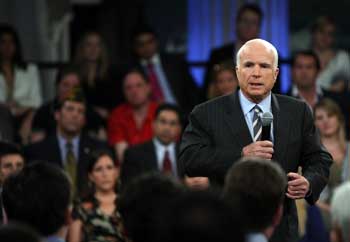By Thalif Deen at the united nations
NEW YORK - As some of the world's political hotspots continue to simmer, the Security Council has remained paralysed because of a sharp division of opinion among its key members.
The split is between the three Western-style democracies -- the US, France and Britain -- and the two "non-Western democracies", Russia and China. All five veto-wielding permanent members exercise the right to declare war, make peace, impose sanctions, and penalize miscreants.
The US wants to impose rigid UN sanctions on Sudan and Iran. But it has been blocked from doing so by Russia and China. France hinted at "humanitarian intervention" in Myanmar in the aftermath of the recent cyclone. But there were no takers -- and certainly not Russia or China.
 |
| Republican presidential candidate John McCain speaks at a town hall meeting at Federal Hall on Thursday in New York City. McCain supports the neoconservative call for the setting up of a League of Democracies. Pic AFP |
The US, France and Britain have indicated their willingness to put Tibet and Chechnya on the Security Council agenda. But China and Russia are adamantly opposed to it. The West wants UN recognition for Kosovo as an independent nation state, but Russia and China reject it.
In Palestine, the political equation is the other way around. Russia and China would like to penalise Israel but they cannot do so because of the unrelenting support for the Jewish state from the US, France and Britain.
In Darfur, Western action has been stymied by both Russia and China, who are protecting their own economic and military interests in the troubled region in Sudan.
All of these politically-divisive issues are unlikely to trigger far-reaching Security Council action because of the bickering in the UN's most powerful body.
The US, the world's only remaining superpower, did act unilaterally nearly six years ago when it invaded Iraq without a clear mandate from the Security Council prompting former Secretary-General Kofi Annan to dub the invasion "illegal."
But since then, the US has been forced to remain politically and militarily restrained unwilling or unable to act decisively in the global scene.
And so, not surprisingly, right-wing neo-conservatives in the US are now pushing for a new organisation, a "League of Democracies", as a possible alternative to the United Nations.
If the Security Council is unwilling to take radical action against perceived enemies of the US, they argue, the only course of action is to have an alternate world body.
McCain backs it
The proposal is slowly picking up steam in the US, largely among conservatives, and primarily because it is being advocated by the presumptive Republican presidential candidate Senator John McCain.
Ivo Daalder, an adviser to Democratic Presidential candidate Barack Obama is also supportive of the idea of a League of Democracies. But Obama himself has not made any commitments.
McCain describes the proposed body as comprising "like-minded nations working together in the cause of peace." And, "It could act where the UN fails to act."
Such an organisation of democracies, he has argued, could pressure tyrants "with or without Moscow's and Beijing's approval" and could "impose sanctions on Iran and thwart its nuclear ambitions" while helping struggling democracies succeed.
If elected president, McCain says he will hold a summit of world democracies (Russia and China need not apply) to create an organisation that could "bypass gridlock at the UN."
The supporters of the proposal say its strength may lie in the fact that the League of Democracies will encompass not only Western democracies but also non-Western democracies such as Brazil, South Africa, Nigeria and India.
However, the proposal has come under fire among those who continue to have faith in the United Nations as the only hope for global peace.
Thomas Carothers of the Carnegie Endowment for International Peace, says: "I think there is a serious under-appreciation in Washington for how strongly many democracies in the world, especially in the developing world, disagree fundamentally with the US outlook on interventionism,"
South Africa, a multi-party democracy in Africa, has refused to support any form of intervention in Zimbabwe after its recent flawed presidential elections. India, the world's largest single democracy, has been reluctant to either isolate Myanmar or support sanctions on Iran, perhaps in its own national interests. In an op-ed piece in the Guardian last month, former UN Under-Secretary-General Shashi Tharoor points out that it is specious to argue that collective action by a group of democracies (when the UN is unable to act) would enjoy international legitimacy.
"The legitimacy of democracies comes from the consent of the governed; when they act outside their own countries, no such legitimacy applies."
He also says the reason that decisions of the UN enjoy legitimacy across the world lies not in the democratic virtue of its members, but in its universality. "This is the time to renovate and strengthen the UN, not to bypass it."
|

